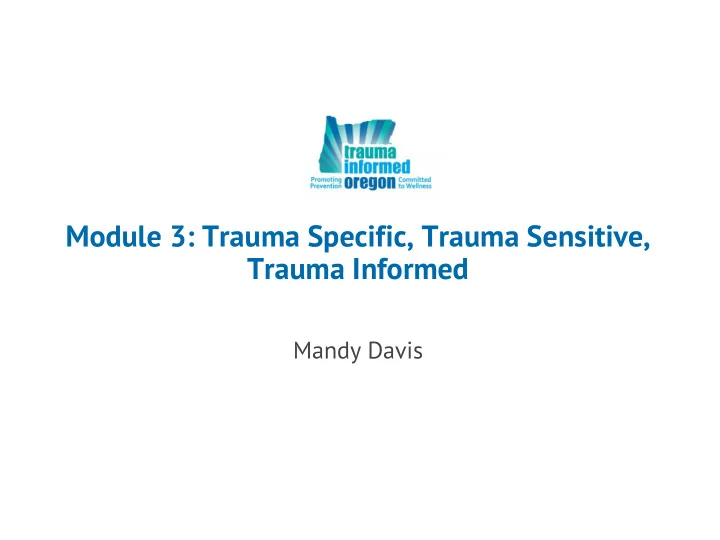

Module 3: Trauma Specific, Trauma Sensitive, Trauma Informed Mandy Davis
Agenda BE GENTLE: New territory ahead
Agenda • Definition of Trauma Specific • Definition of Trauma Sensitive • Definition of Trauma Informed • Examples of how systems might provide Trauma Specific Treatment but not be Trauma Informed
Trauma Informed Care “A program, organization, or system that is trauma - informed: realizes the widespread impact of trauma and understands potential paths for recovery; recognizes the signs and symptoms of trauma in clients, families, staff, and others involved with the system; and responds by fully integrating knowledge about trauma into policies, procedures, and practices, and seeks to actively resist re- traumatization.” (SAMHSA’s Concept of Trauma and guidance for a Trauma -Informed Approach, 2014 http://store.samhsa.gov/shin/content/SMA14-4884/SMA14-4884.pdf)
Trauma Informed Care “A program, organization, or system that is trauma - informed: realizes the widespread impact of trauma and understands potential paths for recovery;
Trauma Informed Care “A program, organization, or system that is trauma - informed: realizes the widespread impact of trauma and understands potential paths for recovery; recognizes the signs and symptoms of trauma in clients, families, staff, and others involved with the system; and
Trauma Informed Care “A program, organization, or system that is trauma - informed: realizes the widespread impact of trauma and understands potential paths for recovery; recognizes the signs and symptoms of trauma in clients, families, staff, and others involved with the system; and responds by fully integrating knowledge about trauma into policies, procedures, and practices, and seeks to actively resist re- traumatization.” (SAMHSA’s Concept of Trauma and guidance for a Trauma -Informed Approach, 2014 http://store.samhsa.gov/shin/content/SMA14-4884/SMA14-4884.pdf)
Trauma Informed Care “A program, organization, or system that is trauma - informed: realizes the widespread impact of trauma and understands potential paths for recovery; recognizes the signs and symptoms of trauma in clients, families, staff, and others involved with the system; and responds by fully integrating knowledge about trauma into policies, procedures, and practices, and seeks to actively resist re-traumatization .” (SAMHSA’s Concept of Trauma and guidance for a Trauma -Informed Approach, 2014 http://store.samhsa.gov/shin/content/SMA14-4884/SMA14-4884.pdf)
Trauma Specific v. Trauma Informed
Trauma Specific v. Trauma Informed • Trauma Recovery/Trauma Specific Services • Reduce symptoms • Promote healing • Teach skills • Psycho-empowerment and education, mind-body, other modalities • Trauma Sensitive • Bring an awareness of trauma into view • Trauma lens • Trauma Informed Care • Guide policy, practice, and procedure • Assumption: every interaction with a survivor of trauma activates a trauma response or does not • Corrective emotional experiences • Parallel process
Trauma Specific v. Trauma Informed • Trauma Recovery/ Trauma Specific Services • Reduce symptoms • Promote healing • Teach skills • Psycho-empowerment and education, mind-body, other modalities
Trauma Specific v. Trauma Informed • Trauma Recovery/ Trauma Specific Services • Reduce symptoms • Promote healing • Teach skills • Psycho-empowerment and education, mind-body, other modalities • Trauma Sensitive • Bring an awareness of trauma into view • Trauma lens
Trauma Specific v. Trauma Informed • Trauma Recovery/Trauma Specific Services • Reduce symptoms • Promote healing • Teach skills • Psycho-empowerment and education, mind-body, other modalities • Trauma Sensitive • Bring an awareness of trauma into view • Trauma lens • Trauma Informed Care • Guide policy, practice, and procedure • Assumption: every interaction with a survivor of trauma activates a trauma response or does not • Corrective emotional experiences • Parallel process
Everyone should be trauma informed
Everyone should be trauma informed Not everyone should do trauma specific service
Everyone should be trauma informed Not everyone should do trauma specific service Refer out
Everyone should be trauma informed Not everyone should do trauma specific service Refer out Contract in
Safety
Safety Trustworthiness and transparency
Safety Trustworthiness and transparency Peer support and mutual self help
Safety Trustworthiness and transparency Peer support and mutual self help Collaboration and mutuality
Safety Trustworthiness and transparency Peer support and mutual self help Collaboration and mutuality Empowerment, voice and choice
Safety Trustworthiness and transparency Peer support and mutual self help Collaboration and mutuality Empowerment, voice and choice Cultural, historical, and gender issues
Safety Trustworthiness and transparency Peer support and mutual self help Collaboration and mutuality Empowerment, voice and choice Cultural, historical, and gender issues SAMHSA’s Concept of Trauma and guidance for a Trauma -Informed Approach, 2014 http://store.samhsa.gov/shin/content/SMA14-4884/SMA14-4884.pdf
Being trauma informed is
Being trauma informed is Critical for survivors and those who have experienced toxic stress
Being trauma informed is Critical for survivors and those who have experienced toxic stress Valuable for all people regardless of trauma history
Do you provide trauma specific services?
Do you provide trauma specific services? Do you need to?
Do you provide trauma specific services? Do you need to? If you don’t, are there enough resources in the community for people to access?
Do you provide trauma specific services? Do you need to? If you don’t, are there enough resources in the community for people to access? Do folks in your community have access to culturally responsive and linguistically appropriate trauma specific services?
Is your organization trauma informed?
Is your organization trauma informed? What are you currently doing?
Is your organization trauma informed? What are you currently doing? Are there areas for improvement?
Is your organization trauma informed? What are you currently doing? Are there areas for improvement? What are the barriers as you strive to be trauma informed?
Recommend
More recommend